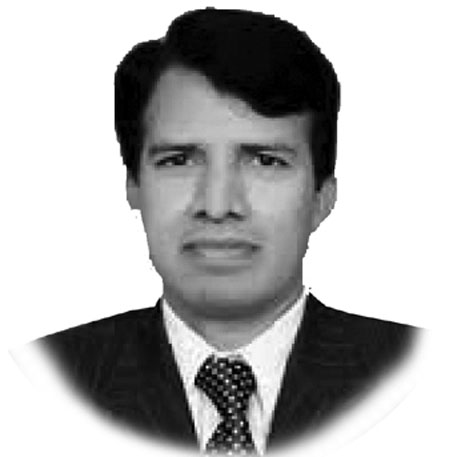Dr Muhammad Khan
OVER the years, there has been a gradual institutional decay in Pakistan. Owing to this unfortunate deterioration of institutions, the masses lost their trust over the institutions which caused insubstantiality and insecurity among the wider Pakistani society. The political parties, Parliament and the elected representatives of the people also fell short of the expectations of the people. The malpractices of the existing institutions, violation of merit system, corruption and bribery further discredited the institutions and those managing them. An analysis of the institutions and organizations like Pakistan Railways, Pakistan International Airline and Pakistan Steal Mills clearly reflects the horrific state. Other institutions and organizations either under federal government or provincial governments have the similar reputation. The institution of Police, WAPDA, finance, commerce, textile and industry are all decaying. Besides, the educational institutions under government; from schools to universities are in their worst form. Those deputed for their managerial and executive jobs have been enjoying the unprecedented perks and privileges. Despite their awesome perks and privileges, these institutions have faced a gradual down-fall with losses in billions.Successive governments have been compensating their losses without much hope of reparation and their refurbishment. Indeed, losing billions of rupees annually without accountability of any one or those become reason of their down-fall.
Military is the only institution in Pakistan which has progressed and developed over the years. Its development, achievements and progression has been un-parallel. Owing to its extraordinary development and unprecedented successes, Pakistani nation trust this institution without questioning. The question arises why the institution of military is trusted blindly by the masses of Pakistan. After all, it is the same national nursery which provides plants to all national institutions. The institution of military gets the youth from same society, youth with same educational institutions and from similar backgrounds. Then why an officer and a soldier of military is more motivated, determined, positive and result oriented compare to their counter-parts in other national institutions and national organizations. Indeed, it is the basic training, organizational coaching, national orientation, motivational skills, spirit of sacrifice for the nation, strict accountability and above all the merit based selection and career opportunities which distinguish the military from other national institutions. An officer and men of the Military feels proud to serve the nation while ignoring his-self, his family and his material gains. In other institutions and organizations it is quite opposite; preference goes to the self, family and material gains. Therefore the results were to be like that; a clear distinction since orientations is different.
A book written by Maria Rashid, a Pakistani author is a new narrative for creating misperceptions about organizational structure of the military especially Pakistan Army. The author is a psychologist by profession and human rights activists in practice. She delivered a talk on her book launching at London School of Economics and tried to influence the audience while describing militarism affect by using sacrifices in Pak Army as a political tool. Ayesha Saddiqa, another Pakistani writer and a known anti Army writer was also present in the book launching. She directed the discussion against the state and society of Pakistan. Indeed, it was a well-planned event against the security institutions of Pakistan with a new narrative of creating rift among the civil and military institutions and between the Government and the Military. In the contents of her book, the writer attempted to follow the popular spiteful narrative of the so-called Pakistani liberals; living at home or settled in the West. Her argument revolves around massive authority of Pak Army, its vast resources, dependence on one particular province (Punjab) for structuring Army and projecting that Army reinforces its omnipotence in the lives of its soldiers. These arguments run against the ground realities, since Pak Army and indeed the armed forces of Pakistan have national orientation rather having provincial domination.
Indeed, it is misleading assertion, trying to create a split between provinces. Another attempt, the writer tried to create is a clear divide among the officers and men. Troops to officers causality ratio in Pak Army is the highest in the world. During war on terror it was high as 1:12 which means to every 12 soldiers we lost an officer. Later it had risen further to 1:9. We should be very proud of this because our young officer who leads from the front; dies but not buckles. A sizable number of 1 to 3 star generals are on the list of those martyred in Pak Army; unprecedented in the world. Something wrong with her research or else the research designed to make such impact one she says; ‘Pak Army reinforces its omnipotence in the lives of soldiers’. This is a wrong assertion since Pakistani security forces have given unprecedented sacrifices for the national cause. Pakistani security forces lost 5796 personnel during the combat operation from 2009 to 2018.In fact, her book is meant to create a wedge between civil-military institutions and above all segregate between officers and men in Pak Army. At a time once most of the state institutions have lost their credibility, the institution of Military is acting as the centre of gravity for the state and society of Pakistan. The military is the backbone of national security, sovereignty, integrity and unity of Pakistan. During peace and war, the institution of military has always stood up to the expectations of nation. A realistic analysis of the contemporary international militaries would reveal that, Pakistani military is at the peak of its professionalism and motivation while maintaining a very high morale. Let’s defeat all such deviating narratives against Pakistani military through counter narratives and safeguarding national unity.
— The writer is Professor of Politics and IR at International Islamic University, Islamabad.










